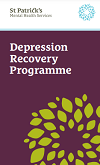Depression is a mood disorder which brings feelings of sadness, helplessness and hopelessness over a period of time. A person who is living with depression can have difficulties with everyday life as a result.
At St Patrick’s Mental Health Services (SPMHS), our Depression Recovery Programme is an online group programme that is designed to support and educate people living with depression or who have symptoms linked with depression.
The programme aims to enable people to:
- gain an understanding of depression
- manage their symptoms effectively
- improve their quality of life.
The principles of Cognitive Behaviour Therapy (CBT), Compassion-Focused Therapy (CFT), and Mindfulness-Based Stress Reduction (MBSR) are used to guide the programme and its content.
The programme is run by a team of mental health professionals who have wide experience and expertise. The team includes cognitive behavioural therapists and psychiatric nurses, with other guest contributors from our multidisciplinary teams (MDTs) – such as a consultant psychiatrist, occupational therapist, pharmacist and social worker.
GPs can refer their patients to our Depression Recovery Programme. Inpatient service users in SPMHS can also be referred by their MDT to take part in the programme.
The programme is currently held online, using Microsoft Teams; our Service User IT Support (SUITS) service offers help in attending online appointments if needed.
Treatment approaches
There are three elements to the programme, which you can learn more about below.
Depression Recovery Programme
The Depression Recovery Programme is a 10-week psychotherapy group programme. It combines approaches from CBT, CFT and MBSR. Sessions are led by cognitive behavioural psychotherapists and nurses with expertise in depression, group therapy, CFT, and mindfulness.
The programme runs for a full day each week as a day patient programme and is currently delivered online.
Depression Recovery Aftercare
Depression Recovery Aftercare is a 12-month psychotherapy group that meets for a half day once a month. It focuses on building on and maintaining the change you made through the Depression Recovery Programme. The group is run by two accredited CBT therapists, and continues to apply the approaches of CBT, CFT and MBSR.
This aftercare group supports you to continue your recovery by challenging the unhelpful thinking, rules for living, core beliefs and behaviours which could leave you more open to a recurrence of depression or, over time, continue difficulties when life challenges arise. It also allows you to practice skills to be able to identify early warning signs of setbacks and to prevent relapse.
The Depression Recovery Aftercare group continues to support you in maintaining a healthy, active lifestyle and practice skills learned during the Depression Recovery Programme using CBT principles.
The group takes place one Friday morning every month.
Depression Recovery Support Seminar
The Depression Recovery Support Seminar takes place over two information and support sessions. A nominated supporter can join you for the sessions. The goal of these sessions is to provide helpful information to friends and family in order to support you in your recovery. Topics covered include information on depression, its management, and how to support people experiencing it, as well as supports for the caregivers themselves.
The Depression Recovery Support Seminar takes place online over two half-day sessions a year.
Continue to…
How to access



